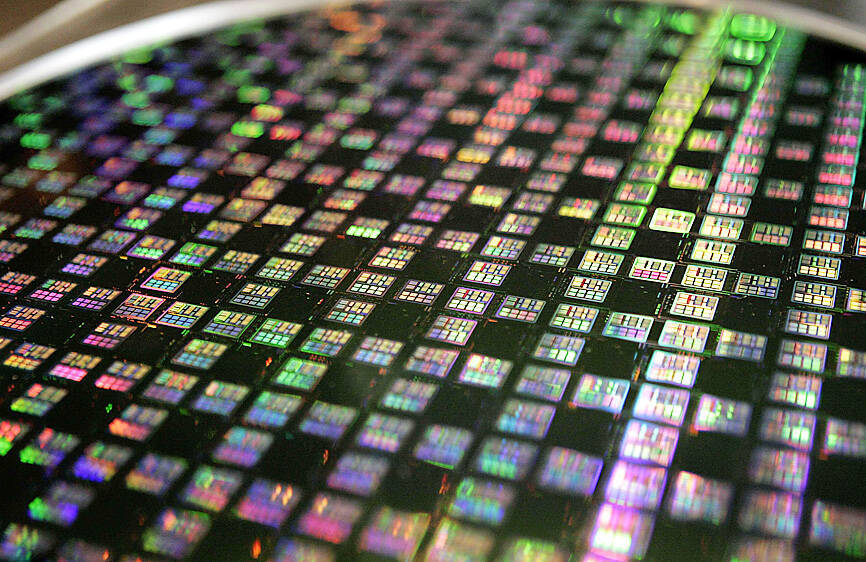It would not be easy for the US to rapidly implement a tariff on imported semiconductors because the cost of the policy to the country would be too high, according to Aaron Friedberg, a politics and international affairs professor at Princeton University.
In response to Taiwanese media’s queries, Friedberg said while US President Donald Trump wants to use tariffs to persuade companies to manufacture in the US, he did not expect the threats to be carried out quickly.
“Given that it will likely take many years to increase US semiconductor manufacturing capacity, the imposition of high tariffs would drive up the costs and reduce the competitiveness of other American industries,” Friedberg said on Wednesday. “For that reason, I would not expect to see these threats carried out all at once or quickly.”

Photo: Richard Chung, Reuters
Trump’s chip tariff threats aimed to push domestic and foreign manufacturers to boost US investments, he said.
“Whether by the threat of tariffs or perhaps more positive inducements and incentives, the US will definitely be trying to encourage Taiwanese and other foreign companies to invest more in the US,” he said.
On Tuesday last week, Trump said he would like to impose a 25 percent tariff on semiconductors, cars and pharmaceuticals, with an official announcement expected as soon as April.
“It’ll be 25 percent and higher, and it’ll go very substantially higher over the course of a year,” Trump said at his Mar-a-Lago residence.
Trump has repeatedly alleged Taiwan “stole our chip business.”
Taiwan Semiconductor Manufacturing Co (TSMC), the world’s largest contract chipmaker, was a self-made success, National Security Council Secretary-General Joseph Wu (吳釗燮) said on Friday.
TSMC is investing US$65 billion in Arizona to build three advanced fabs. In the face of Trump’s tariff threats, it is widely thought that TSMC would establish more sophisticated integrated circuit (IC) assembly plants in the US or even acquire a stake in Intel Corp’s fab operations through technology transfer.
TechSpot, a US-based tech Web site, reported on Thursday that the US and many Western countries are not as efficient as Taiwan when it comes to building semiconductor fabs, saying that “building semiconductor plants in the US takes twice as long, costs twice as much as in Taiwan.”
The West has to streamline fab construction processes to catch up with the semiconductor ecosystems in Taiwan and other Asian manufacturing hubs, it added.
TechSpot highlighted the challenges TSMC has faced in the US, saying that “TSMC struggled to find skilled workers locally, a problem rarely encountered in Taiwan.”
“Cultural differences between TSMC’s Taiwanese management and American employees created unforeseen obstacles,” it said, but that “perhaps most critically, navigating local regulations proved difficult for the global chip manufacturer.”
On Feb. 13, John Bolton, former national security adviser to Trump, said in a media interview that imposing a tariff on chips from Taiwan would not change the reality that the US is dependent on Taiwan-manufactured chips.
The real issue is that the US cannot develop cutting-edge IC capabilities overnight, he said.

The manufacture of the remaining 28 M1A2T Abrams tanks Taiwan purchased from the US has recently been completed, and they are expected to be delivered within the next one to two months, a source said yesterday. The Ministry of National Defense is arranging cargo ships to transport the tanks to Taiwan as soon as possible, said the source, who is familiar with the matter. The estimated arrival time ranges from late this month to early next month, the source said. The 28 Abrams tanks make up the third and final batch of a total of 108 tanks, valued at about NT$40.5 billion

Two Taiwanese prosecutors were questioned by Chinese security personnel at their hotel during a trip to China’s Henan Province this month, the Mainland Affairs Council (MAC) said yesterday. The officers had personal information on the prosecutors, including “when they were assigned to their posts, their work locations and job titles,” MAC Deputy Minister and spokesman Liang Wen-chieh (梁文傑) said. On top of asking about their agencies and positions, the officers also questioned the prosecutors about the Cross-Strait Joint Crime-Fighting and Judicial Mutual Assistance Agreement, a pact that serves as the framework for Taiwan-China cooperation on combating crime and providing judicial assistance, Liang

A group from the Taiwanese Designers in Australia association yesterday represented Taiwan at the Midsumma Pride March in Melbourne. The march, held in the St. Kilda suburb, is the city’s largest LGBTQIA+ parade and the flagship event of the annual Midsumma Festival. It attracted more than 45,000 spectators who supported the 400 groups and 10,000 marchers that participated this year, the association said. Taiwanese Designers said they organized a team to march for Taiwan this year, joining politicians, government agencies, professionals and community organizations in showing support for LGBTQIA+ people and diverse communities. As the first country in Asia to legalize same-sex

MOTIVES QUESTIONED The PLA considers Xi’s policies toward Taiwan to be driven by personal considerations rather than military assessment, the Epoch Times reports Chinese President Xi Jinping’s (習近平) latest purge of the Chinese People’s Liberation Army (PLA) leadership might have been prompted by the military’s opposition to plans of invading Taiwan, the Epoch Times said. The Chinese military opposes waging war against Taiwan by a large consensus, putting it at odds with Xi’s vision, the Falun Gong-affiliated daily said in a report on Thursday, citing anonymous sources with insight into the PLA’s inner workings. The opposition is not the opinion of a few generals, but a widely shared view among the PLA cadre, the Epoch Times cited them as saying. “Chinese forces know full well that